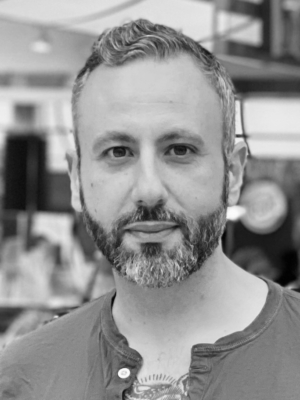Peacock, Egg Harbor City, New Jersey / Catastrophic Sonnet
Peacock, Egg Harbor City, New Jersey
The thing is, you are, yourself, an exercise in noticing—
There is the stealth, what was once called furtive.
The eye-spotted train that refuses, at least today,
to be seen as anything other than a net of jewels.
You’ve roamed all morning. Your spurs say try
me. The rest of you says try again. You are blue
as blue has never been—river water rendered
in glass the moment before birth—green
as green has always been—one part territory,
one part terror. The couple that owns this place
says the peacock has more than one mate. And
did I know that there are plants that bear flowers
with stamens only, some only pistils? Though I
have seen you in the early morning, I imagine you
the same at dusk. Sun and shade, petal and seed
head, becoming anything you can fit into your beak.
You are not only what you are, but what you in-
terrupt: in an RV park. In an American refuge.
You are as much other here as the movement that
made this place. I have seen you before: served
in full plumage in some Flemish painter’s allegory;
in Tulum, the day my second daughter was born;
among the Yazidi girls who jumped to their death
from the sacred mountain; as a gorgeous declaration of war.
Catastrophic Sonnet
“Remembering is an ethical act…” — Aarushi Punia
[My grandfather still has his house key from 1948. He says he lives in the part of the village where the past doesn’t kill you. He invites his neighbors in for fruit and mixed nuts and something cool then something hot. There is a belligerence of songbirds every square mile. He says, come see what I brought you from the market: cucumbers, local, pomegranates, zaatar. I see you’ve renounced your birthplace, which is of course your right. You will dream of male sunbirds feeding on nectar mid-air. When they come for you, they will ask about your love’s name, her contours, her address. Where is it written that we’re supposed to call? I misheard him talk of our rightful place at the top of the hill. My kids fell in love with imperialism last summer in London. They discovered legacy in the gardens. They woke to the logics of the enterprise. I miss the burgers at Johnny’s].
__
Poem Note: “they will ask about your love’s name, her contours, her address” borrows from Waleed Sayf’s poem “Death at Night’s End” translated by Elmusa and Heath-Stubbs (see Salma Khadra Jayyusi’s Anthology of Modern Palestinian Literature, Columbia University Press, 1992).
Issam Zineh is a Los Angeles-born, Palestinian-American poet and scientist. He is the author of the forthcoming chapbook The Moment of Greatest Alienation (Ethel Press, Spring 2021). His poems appear or are forthcoming in Bear Review, Clockhouse, Fjords Review, Glass (Poets Resist), Nimrod, Poet Lore, The Seattle Review, Sporklet, and elsewhere. Find him on Twitter @izineh.





